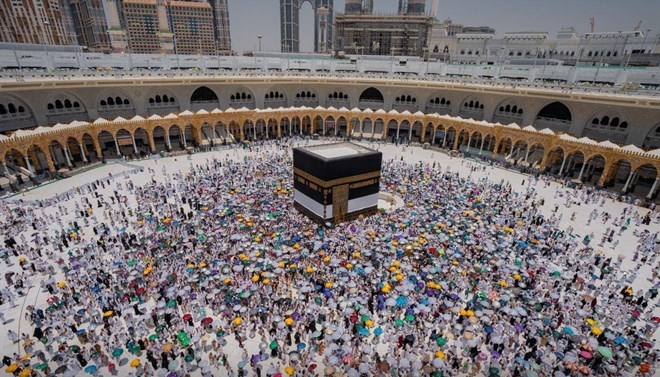
Rana Taha
Sunday June 23, 2024
Cairo said it will prosecute some 16 travel agencies for illegally taking pilgrims to Mecca. Hundreds are believed to have died during the Muslim pilgrimage this year, the majority being from Egypt.

Egypt’s government announced on Saturday that it will prosecute 16 travel agencies and revoke their licenses over the deaths of Egyptians during this year’s Hajjin Mecca.
Over 1000 people are believed to have died during the pilgrimage in Saudi Arabia, with many of the deaths attributed to extreme heat. At least 658 of them were Egyptian.
Temperatures in Mecca, Islam's holiest city, rose to 51.8 degrees Celsius (125 degrees Fahrenheit) during the course of the annual event, which started late last week.
Around 1.8 million Muslims from all over the world had been expected in Saudi Arabia to take part in Hajj.
What did the Egyptian government say?After an emergency meeting on Hajj deaths, the Egyptian government said the high death toll among Egyptian pilgrims this year was a direct consequence of some travel agencies disregarding the rules by sending "unregistered" pilgrims.
To do the Hajj, pilgrims need to have official permission from Saudi Arabia to enter the country. Because more Muslims want to come than there is space for them, Saudi Arabia runs a quota system every year.
Cairo argues that some travel agencies sent pilgrims to Saudi Arabia on personal visit visas, rather than Hajj visas. Such visas do not allow holders access to Mecca, where almost all Hajj rituals take place.
To circumvent that, the Egyptian government said, those pilgrims had to walk through the desert into Mecca, to avoid getting caught by the Saudi authorities. If caught without the correct visa, pilgrims risk arrest and deportation.
Egypt to prosecute 16 agencies
Unregistered pilgrims do not benefit from the facilities on offer by the Saudi authorities to alleviate the hardships of some rituals, most of which take place outdoors amid the scorching heat.
Egyptian authorities also say those travel agencies did not provide the pilgrims they sent with "appropriate accommodation," adding that this caused pilgrims' "exhaustion due to the high temperatures."
The Egyptian authorities documented 31 deaths among registered Egyptian pilgrims, citing "chronic diseases" as the cause of deaths. Foreign Minister Sameh Shoukry said that most of those who died were unregistered pilgrims.
"Travel agencies which facilitated their travel did not offer them any services," he said.
A government report on the crisis initially listed 16 travel agencies as responsible.
"The prime minister has ordered the licenses of these companies to be revoked, their managers to be referred to the public prosecutor and the imposition of a fine to benefit the families of the pilgrims who died because of them," the Egyptian cabinet said.
Some victims' families are blaming the Saudi authorities or the authorities of their own countries for not being organized enough or failing to provide enough shelter from the extreme heat.
What is the 'unregistered' pilgrimage route?
The unregistered route to Mecca to perform Hajj rituals is fairly recent.
In late 2019 the Saudi kingdom introduced tourist visas, allowing foreigners from several countries to obtain visas to visit the country. Before that, travel into Saudi Arabia was mostly restricted to business, family visits and religious trips.
The first few Hajj seasons following the arrival of the tourist visa were curtailed by the COVID-19 pandemic.
Apart from the difficulty of acquiring a Hajj visa due to the imposed quotas and lottery system, the unregistered route is favored by many due to its significantly cheaper cost. Hajj via the official route usually costs thousands of dollars for pilgrims arriving from abroad.
One of the world's largest religious gatherings, Hajj is one of the five pillars of Islam. Every Muslim who is able to is supposed to perform it at least once in their lifetime.
Material from AFP contributed to this report
Edited by Louis Oelofse